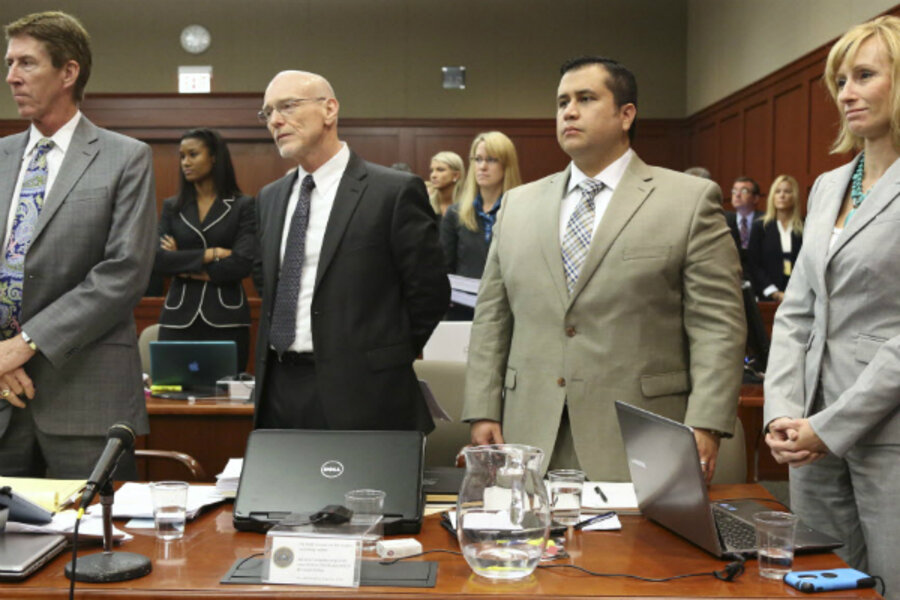Zimmerman trial: Joke by defense is a bust
Loading...
| Sanford, Fla.
George Zimmerman was fed up with "punks" getting away with crime and shot 17-year-old Trayvon Martin "because he wanted to," not because he had to, prosecutors argued Monday, while the neighborhood watch volunteer's attorney said the killing was self-defense against a young man who was slamming Zimmerman's head against the pavement.
The prosecution began opening statements in the long-awaited murder trial with shocking language, repeating obscenities Zimmerman uttered while talking to a police dispatcher moments before the deadly confrontation.
The defense opened with a knock-knock joke about the difficulty of picking a jury for a case that stirred nationwide debate over racial profiling, vigilantism and Florida's expansive laws on the use of deadly force.
"Knock. Knock," said defense attorney Don West.
"Who is there?"
"George Zimmerman."
"George Zimmerman who?"
"All right, good. You're on the jury."
The courtroom was silent. He later apologized for the poor delivery.
Zimmerman, 29, could get life in prison if convicted of second-degree murder for gunning down Martin on Feb. 26, 2012, as the unarmed black teenager, wearing a hoodie on a dark, rainy night, walked from a convenience store through the gated townhouse community where he was staying.
The case took on racial dimensions after Martin's family claimed that Zimmerman had racially profiled Martin and that police were dragging their feet in bringing charges. Zimmerman, whose mother is Hispanic and whose father is white, has denied the confrontation had anything to do with race.
Prosecutor John Guy's first words to the jury recounted what Zimmerman told a dispatcher in a call shortly after spotting Martin: "F------ punks. These a-------. They always get away."
Zimmerman was profiling Martin as he followed him, Guy said. He said Zimmerman viewed the teen "as someone about to a commit a crime in his neighborhood."
"And he acted on it. That's why we're here," the prosecutor said.
Zimmerman didn't have to shoot Martin, Guy said. "He shot him for the worst of all reasons: because he wanted to," he said.
The prosecutor portrayed the watch captain as a vigilante, saying, "Zimmerman thought it was his right to rid his neighborhood of anyone who did not belong."
West told jurors a different story: Martin sucker-punched Zimmerman and then pounded the neighborhood watch volunteer's head against the concrete sidewalk, and that's when Zimmerman opened fire.
Showing the jury photos of a bloodied and bruised Zimmerman, the defense attorney said, "He had just taken tremendous blows to his face, tremendous blows to his head."
West said the story that Martin was unarmed is untrue: "Trayvon Martin armed himself with a concrete sidewalk and used it to smash George Zimmerman's head."
The prosecutor, however, disputed elements of Zimmerman's story, including his claim that Martin put his hands over Zimmerman's mouth and reached for the man's gun. Guy said none of Zimmerman's DNA was found on Martin's body, and none of the teenager's DNA was on the weapon or the holster.
But West said that doesn't prove anything, arguing that crime-scene technicians didn't properly protect Martin's hands from contamination.
Two police dispatch phone calls that could be important evidence for both sides were played for the jury by the defense. Martin's mother, Sybrina Fulton, left the courtroom before the second recording, which has the sound of the gunshot that killed Martin.
The first was a call Zimmerman made to a nonemergency police dispatcher, who told him he didn't need to be following Martin.
The second 911 call, from a witness, captures screams in the distant background from the struggle between Zimmerman and Martin. Martin's parents said the screams are from their son, while Zimmerman's father contends they are his son's.
Circuit Judge Debra Nelson ruled last weekend that audio experts for the prosecution won't be able to testify that the screams belong to Martin, saying the methods used were unreliable.
On Monday, one of the first witnesses for the prosecution was a custodian of police dispatch calls. During the witness' testimony, prosecutors started playing police calls Zimmerman had made in the months before he shot Martin. The defense objected, arguing the calls were irrelevant.
The judge said she would address the matter Tuesday and sent the jurors to the hotel where they are being sequestered for the duration of the trial, which could last several weeks
Other witnesses who testified Monday included a convenience store clerk and the 911 dispatcher who took Zimmerman's call when he was following Martin. Martin had gone to the convenience store to buy Skittles and a can of iced tea.
The 911 dispatcher, Sean Noffke, testified that he had advised Zimmerman not to follow Martin.
Randy McClean, a criminal defense attorney in Florida with no connection to the case, called the prosecution's opening statement "brilliant" in that it described Zimmerman's state of mind. But he described the knock-knock joke as less than stellar.
"If you're defending your client for second-degree murder, you probably shouldn't start your opening with a joke," McClean said.
One thing missing on Monday was visible demonstrations outside the courthouse.
Late Monday, the Seminole County NAACP held a town hall meeting at a church near a memorial site for Martin.
Martin family attorney Benjamin Crump, who as a potential witness in the case can't be present in the courtroom until he testifies, told the crowd that the outcome of the case would have far-reaching implications.
"It became a civil rights matter the night the police did not arrest the killer of an unarmed child," Crump said. "It's going to be a litmus test to show how far we have come."
___
Follow Kyle Hightower on Twitter at http://twitter.com/KHightower
Follow Mike Schneider on Twitter at http://twitter.com/MikeSchneiderAP
Copyright 2013 The Associated Press.







